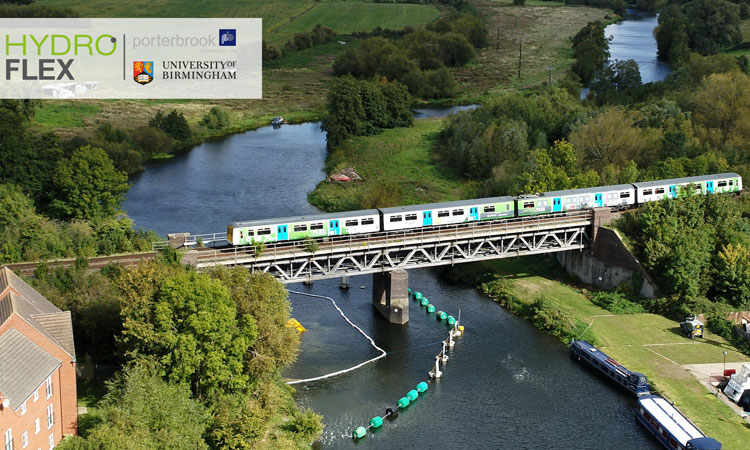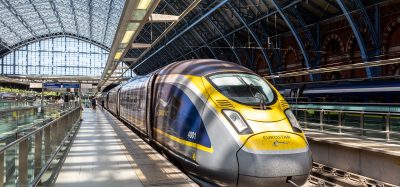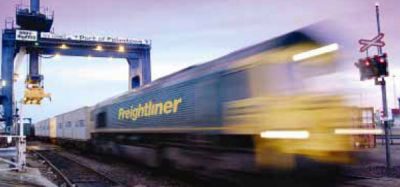Investing today to support tomorrow’s railway
Posted: 6 April 2021 | Mary Grant | 1 comment
Mary Grant, Chief Executive Officer of Porterbrook, highlights how investment and innovation in the private sector can help to support the UK’s ambition to be a leader in low carbon rail.
It was great to hear that the U.S. President, Joe Biden, and the UK Prime Minister, Boris Johnson, bonded over a ‘mutual love of rolling stock’ in the first call between the two leaders earlier in 2021, according to news reports. At Porterbrook, we share their passion and agree that ‘electric train travel is the green alternative to cars.’
For many years, we have been investing in new technologies, such as battery powered trains, hybrid engine technology and hydrogen power.
From North America to Asia, it is increasingly evident that investment in rail infrastructure can have a substantial economic and environmental impact, which can positively support the post-pandemic recovery by boosting growth and supporting the transition to green jobs. In the UK, many private sector businesses, including Porterbrook, have both the finance and expertise to assist the UK government in achieving net zero by 2050.
Porterbrook owns and manages around a quarter of the UK railway’s passenger rolling stock – about 4,000 vehicles. We have invested £3 billion since 1996 and are looking to invest a further £1 billion in Britain’s railway in the years ahead. Our approach to asset ownership and management is that trains should be used for their full 30-year life to ensure maximum benefits for passengers, taxpayers and the environment. Such a timeframe requires constant innovation to renew and refurbish those assets.
For many years, we have been investing in new technologies, such as battery powered trains, hybrid engine technology and hydrogen power. These new forms of traction have the potential to improve air quality, reduce emissions and increase network reliability and performance.
Our current improvement programme across our fleets is being delivered through partnerships with many leading companies, such as Alstom, Atkins, Unipart and Wabtec. We also work with more than 100 UK-based small and medium enterprises (SMEs) to maintain and upgrade our assets, investing £3 million every week in the supply chain, which supports 7,000 UK jobs.
Later in 2021, we will be providing our customer, Chiltern Railways, with the first diesel train fitted with Rolls Royce MTU Hybrid PowerPacks. The technology allows both diesel and hybrid electric operation, which fulfils future EU Stage V emissions regulations. This enables very low noise and emissions-free battery operation at stations and in urban areas. We are also exploring the fitment of battery technology to two of our existing electric train fleets. This will enable these trains to operate on non-electrified routes under battery power, extending the range of electric trains, increasing journey opportunities, delivering greater operational flexibility and reducing reliance on diesel traction.


In 2018, we began working with the University of Birmingham to develop and deliver HydroFLEX, the UK’s first hydrogen powered train. HydroFLEX completed mainline testing in September 2020, and we are now building a production version of HydroFLEX for delivery in 2021, offering clean air and decarbonisation benefits to parts of the network where the electrification of the infrastructure cannot currently be justified.
I was pleased to see the House of Commons Transport Committee urge the UK government to ensure that ‘hydrogen trains are fully incorporated within the forthcoming national Hydrogen Strategy’, and that ‘this new technology is properly co-ordinated and supported by appropriate infrastructure.’
In addition, integrated and connected urban transport will remain important for the future growth of city regional economies. The new way of working which emerges from the pandemic could see employees returning to offices for just three days a week. Whilst there may be a reduction in the demand for classic peak-time commuting, the demand for leisure travel is likely to become more pronounced. This, combined with an expected increase in long distance travel, as people are no longer tied to a geographical proximity to their office, will fuel new passenger flows that the railway needs to respond to.
I am particularly proud of the £100 million five-year investment programme that we are currently undertaking on 270 of our Electrostar trains that are operated by Govia Thameslink Railway (GTR), the UK’s largest passenger operator.
I am particularly proud of the £100 million five-year investment programme that we are currently undertaking on 270 of our Electrostar trains that are operated by Govia Thameslink Railway (GTR), the UK’s largest passenger operator. These trains are being upgraded with live passenger information screens, USB/power points, passenger counting technology and high-tech on-board operation systems, with the work being undertaken at the Selhurst depot in South East London. The modifications will enhance fleet reliability and support Network Rail through infrastructure monitoring.
This fleet renewal is a great example of the circular-economy in action, where the full value of an asset is maximised. Using these trains for their full asset life of 30 years can enhance value and support decarbonisation by ensuring that sunk-carbon is fully exploited, benefitting both passengers and taxpayers.
Elsewhere, our work with Eminox has seen us fit some of our existing diesel trains with an exhaust after-treatment system, which reduces harmful emissions. This technology reduces nitrous oxide emissions by over 75 per cent and hydrocarbons and carbon monoxide by over 90 per cent. Following the InnovateUK-backed trial on a South Western Railway (SWR) Class 159 unit, this will be rolled out on similar fleets across the network. A second trial is also taking place on East Midlands Railway’s (EMR) Class 170 fleet, where we hope to achieve similar benefits.
Britain’s railway will be critical as the country builds back from the COVID-19 pandemic.
Better leveraging of data can also help to deliver a more efficient and sustainable railway, and our partnership with Wabtec and Unipart Rail is supporting six train operators to increase engine reliability through predictive maintenance. We are investing £2 million in hardware, spending £1 million in the digital supply chain and building a dedicated team of embedded engineers. Our target is to achieve a 60 per cent reduction in engine-related delays across these diesel fleets.
I’m also delighted that Porterbrook has re-entered the UK rail freight market in March 2021 in support of our customer, GB Railfreight (GBRf). The partnership will see us supply 100 intermodal twin freight wagons to be built by Greenbrier, starting in August 2022 and completing by summer 2023. Rail freight has a significant role to play in reducing long distance lorry movements, as well as supporting the Green Recovery. Porterbook is keen to play our part in accelerating this modal shift.
Britain’s railway will be critical as the country builds back from the COVID-19 pandemic. In the year of the COP26 global climate change summit, Porterbrook’s investment and innovation programme is one example of how the private sector can help to support the government’s ambition for the UK to be a leader in low carbon rail and green jobs.


Related topics
Coronavirus/COVID-19, Rolling Stock Orders/Developments, Sustainability/Decarbonisation








Very Interesting article. Thank you Mary, working for a global supplier to the rail industry and focusing on the UK rail market, it is interesting to see the roles that different companies within the sector within each country are taking on. As I know Porterbrook well, I do know that Innovation has been high on their agenda for a number of years.